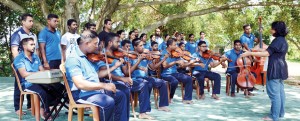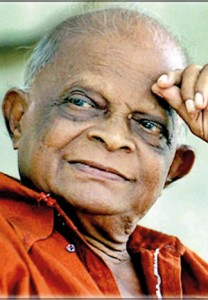Rebirth of ‘Pirinivan Mangallaya’

Perfect setting for soothing sounds: Gayathri conducts musicians and singers under the Nuga tree at the Bellanwila temple. Pix by Indika Handuwala
It is under a spreading Nuga tree, with its leaves gently rustling in the winds blowing from the adjacent waterway across from the famed Bellanwila temple that the beautiful voices, accompanied by soft music gradually rise to a crescendo.
The ‘re-enactment’ of the very first Buddhist Cantata, ‘Pirinivan Mangallaya’ (The passing away of the Gautama Buddha) is being practised in apt surroundings and we are privileged to sit-in, being transported through the music and the singing to a brief respite of serenity and tranquillity which soothes our very beings.
The orchestra and singers are from the Sri Lanka Navy and the trainer and conductor is none other than Gayathri, the daughter of Maestro Dr. Premasiri Khemadasa.
‘Khemadasa Master’ was one of the ‘greats’ in Sri Lanka’s musical journey, a composer par excellence, who not only dabbled in the country’s music tradition but also extended his horizons to explore music around the world, developing his own unique style. He was well-known for his use of elements from Classical Western music.
And the practices are being held at Bellanwila’s Abhina Academy of veteran actress Anoja Weerasinghe who herself was part of the singers in the very first performance of ‘Pirinivan Mangallaya’ in the hallowed precincts of Buddhagaya, India, way back on Vesak Day of May 2007.
It is as a tribute to the Master that ‘Anoja Aunty’ coaxed Gayathri to take up the baton and not let this first Buddhist Cantata be just a memory. ‘Pirinivan Mangallaya’ had first been performed in Sri Lanka in 1990.
For us, Cantata is linked to Christian performances, with oft mentions during Christmas and Easter and that becomes our first puzzled query.

Thaththa: Maestro Khemadasa and (below) Podi Putha: Gayathri
“Yes,” smiles Gayathri who now runs the Khemadasa Foundation. “It comes from the Italian verb ‘Cantare’ — to sing. The basic meaning is a vocal composition with instrumental accompaniment. It first appeared in the 17th century along with opera and oratorio and Cantatas were in great demand by the church.
Thaththa decided to do a Cantata about the Buddha’s final hours, she says, and as his 15-year-old ‘Podi Putha’, she watched her talented father do so in 1990 with just four singers selected from among the students who were training under him. This was followed in 1991-1992 with a joint performance with internationally recognized conductor and pianist Rohan Joseph de Saram and his orchestra.
“It was a unique performance which elicited a standing ovation and an encore call from the audience,” says Gayathri, who left soon after for her own training (to Prague in Czechoslovakia and later in America in piano, harpsichord and also composition) in the same passion of Thaththa — music. Later, as a composer in her own right she would produce the opera ‘Phoolan Devi’, based on the life and times of the infamous but revered ‘Bandit Queen’ of India.
As Master, whose yearning was to take music into the remotest and humblest homes, trod the weary miles, performing at temples and schools, in the orchestra was his elder daughter, Anupa, on cello.
Wonderful occurrences happened just after the performance of the ‘Pirinivan Mangallaya’. Welcome showers ended the heavy drought gripping Buddhagaya soon after, while in some areas in Sri Lanka lashing rains ceased, bringing out clear skies, just before the performance.
Coming back to the present, Gayathri recalls how when they were planning to perform ‘Pirinivan Mangallaya’, Anoja Aunty suggested that they make an offer to the Sri Lanka Navy to join them. For Anoja has been working with the Navy which is engaged in numerous community service programmes.
Navy Commander Vice Admiral Ravi Wijegunaratne and Chief of Staff Rear Admiral S.S. Ranasinghe took up the offer without reservation.
The training for ‘Pirinivan Mangallaya’ began in March, with yoga, breathing exercises and voice training under the able tutelage of Anoja herself, who had had her initiation under the Master. Then Gayathri took over the 26-member Navy orchestra (with its violins, viola, cello, bass, sitar, flute, oboe and percussion) and 26-member choir.

While Gayathri says there is much talent, in one voice the Navy performers represented by Lieutenant Amila Siriwardana from Gampola, Umesh Adikaram from Bandarawela, Supun Thilini from Badulla and Inoka Sandamali Samarasinghe from Kegalle talk of this great opportunity and “pina” (blessing).
The Navy, meanwhile, is hoping to invite small groups of schoolchildren from areas where they have bases in Colombo, Medawachchiya, Mollikulam, Kankesanthurai, Trincomalee, Panama and Galle for the performance on August 25 at the Nelum Pokuna.
After the performance at Nelum Pokuna, Gayathri hopes to follow in the footsteps of her Thaththa’s dearest wish. “For Thaththa, music was all-powerful and his vision was not only to educate ourselves through music but also others. Words such as Cantata and Opera are in music syllabi but many do not know their right meaning and there is a lot of misinterpretation. So where do you start……it has to be in schools,” she says.
So Gayathri using the channel of the Khemadasa Foundation, the Abhina Academy and the Navy will take ‘Pirinivan Mangallaya’ to the far corners of Sri Lanka. Their performances to school audiences will be followed by workshops for both teachers and students with the very well trained Navy personnel turning trainers.
“This will be a beautiful way of reconciliation and bridging the divide between the south and the northeast,” says Anoja.
For Gayathri it will be a labour of love……..as she will be taking the legacy of her beloved Thaththa among the children of rural Sri Lanka.
| When and where ‘Pirinivan Mangallaya’, the first Buddhist Cantata in the world, will be re-performed on August 25 at 6.30 p.m. at the Nelum Pokuna in Colombo. No tickets are on sale, as attendance is only by invitation. Invitations may be requested from the Navy’s Media Coordinator Captain Akram Alavi by calling 0777864055/0773080460 or 011-2212141.
|


